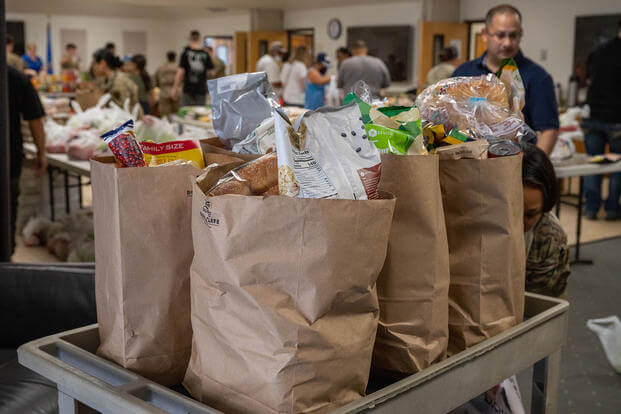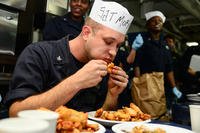Less than 5% of the nation's 1.4 million veterans who struggle with having enough to eat are enrolled in the Supplemental Nutrition Assistance Program, commonly known as food stamps, even though many may be eligible for the benefit, a new report has found.
Research from Rand Corp. sought to determine how many of the nation's 18 million veterans are "food insecure," meaning they have limited access to a safe and adequate food supply, and whether those who go hungry are accessing assistance programs.
The study, "Food Insecurity Among Veterans: Examining the Discrepancy Between Veteran Food Insecurity and Use of the Supplemental Nutrition Assistance Program," published last month, found that less than one-third of hungry veterans received SNAP benefits, compared with 38% of the non-veteran population facing food shortages.
Read Next: After Missing Recruiting Goals, Army Announces New Occupational Specialty to Increase the Ranks
Participation rates were lowest among veterans 70 years and older and those with a mental or physical disability who were unable to work as a result of their injuries or illness, according to the report.
The researchers said more study is needed to determine why veterans don't sign up for food stamps in the face of food insecurity, but they had several theories, beginning with the method that states use to calculate income for food stamp eligibility.
SNAP is a federal program administered by the states, which are responsible for determining eligibility and benefits levels based on federal guidelines as well as their own. Since states typically include Department of Veterans Affairs benefits in income eligibility calculations, "it is possible that these benefits pushed veterans' incomes above the eligibility thresholds," the researchers wrote.
Some food-insecure veterans also may not know they are eligible for SNAP or may be too proud to apply, fearing that participation would "appear to undermine their self-reliance," the authors noted. They may perceive a stigma surrounding the benefit or believe that others may need the benefit more than them -- a sense of altruism, according to the report.
"Low enrollment by food-insecure veterans could be the result of not meeting nutrition assistance eligibility requirements, perceived lack of eligibility, social stigma associated with SNAP participation, or negative messaging around nutrition assistance," the report said.
According to Rand, the VA and state and local governments should have a vested interest in alleviating food insecurity among veterans as well as the general population.
Unhealthy eating habits, poor nutrition or hunger can contributed to poorly controlled high blood pressure, diabetes, mental health conditions, stress, challenges in managing daily activities and increased risk for suicide, according to the report.
The authors said that perceived food insecurity among veterans may contribute to recruiting or retention issues since, although veterans tend to be more financially stable than civilians, "the knowledge that serving in the armed forces might not mitigate existing financial hardship could be a major deterrent" to military service.
To combat food insecurity among active-duty families, Congress approved a new benefit in 2023 -- the Basic Needs Allowance -- for troops with dependents whose gross household income falls below 130% of the federal poverty level depending on family size and location.
According to the Government Accountability Office, more than 280,000 service members reported food insecurity in 2019 but just 22,000 were using SNAP.
Sens. Tammy Duckworth, D-Ill., and Lisa Murkowski, R-Alaska, reintroduced a bill this year that would exclude the military's Basic Allowance for Housing from income calculations used to determine eligibility for SNAP -- a barrier the senators say keeps military families from getting needed assistance.
Similar legislation has been introduced in the House by Rep. Jimmy Panetta, D-Calif.
The Rand paper noted that veterans may not apply for SNAP because they were denied the benefit while serving on active duty as a result of the inclusion of BAH in their incomes and recommended that states reduce potential eligibility barriers, such as income limits, to encourage SNAP participation among veterans, particularly those who are older or unable to work because of a disability.
The authors also recommended that the VA increase food insecurity screenings for veterans who receive VA health care and encourage states to adopt policies that encourage participation in SNAP. They also recommended that the VA; the Department of Agriculture, which runs SNAP; and the Department of Defense work together to identify and support veterans experiencing hunger.
"There are many opportunities to improve support for food-insecure veterans and prevent at-risk groups of veterans from falling through the cracks when it comes to safety-net programs, including SNAP," they wrote.
-- Patricia Kime can be reached at Patricia.Kime@Military.com.
Related: House Defense Bill Expected to Expand Food Allowance for Needy Troops















